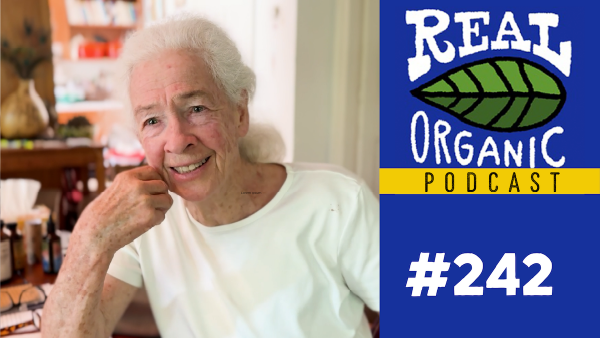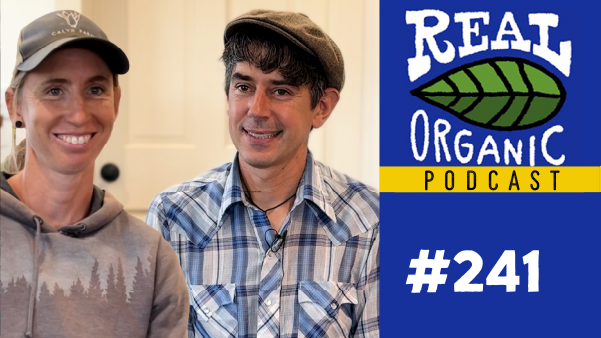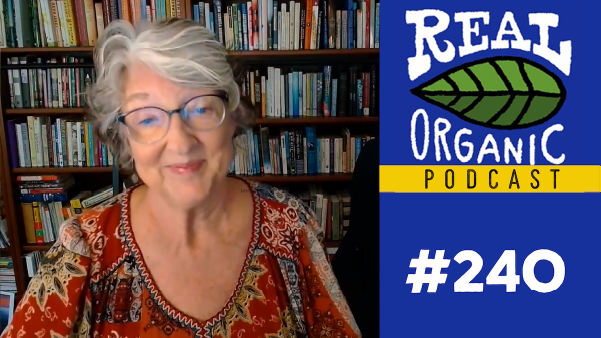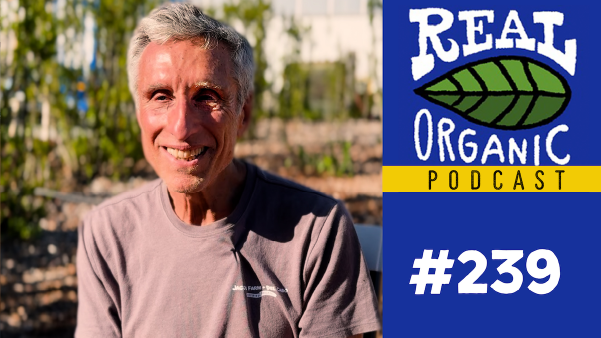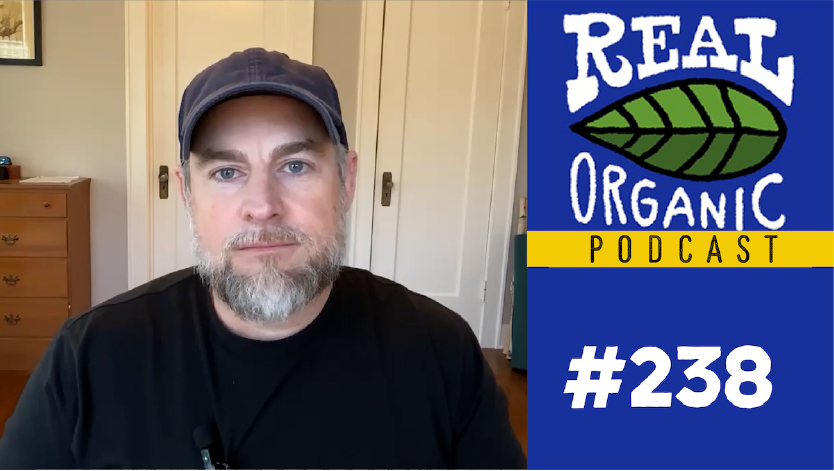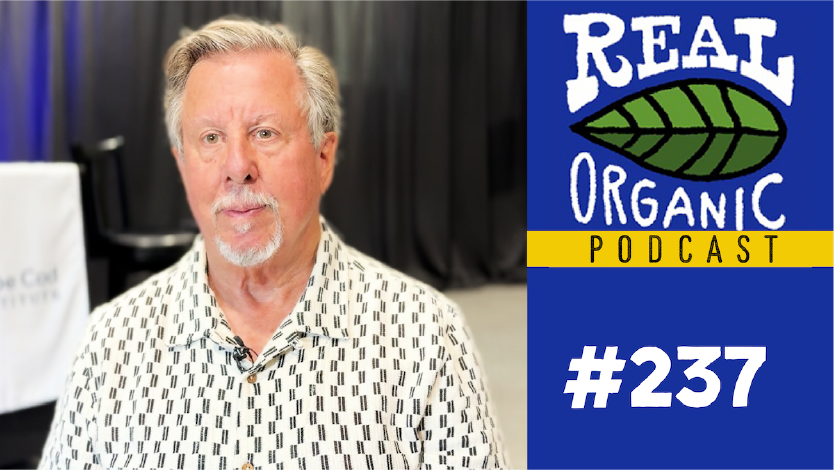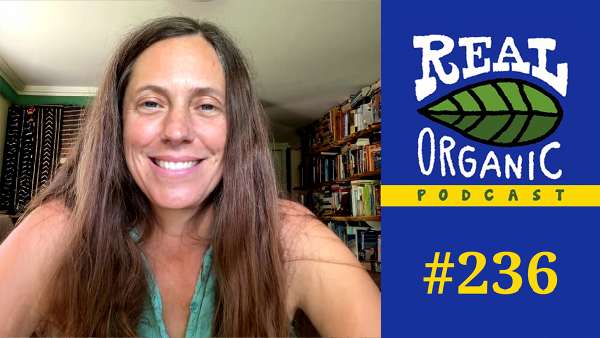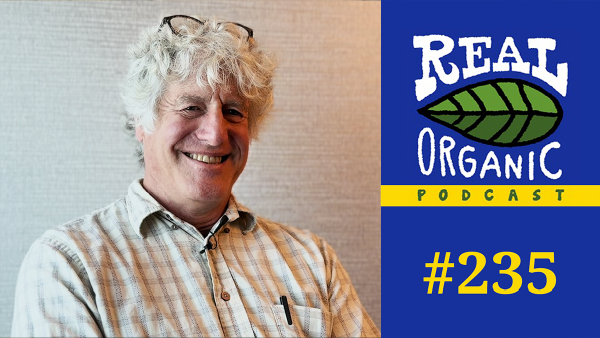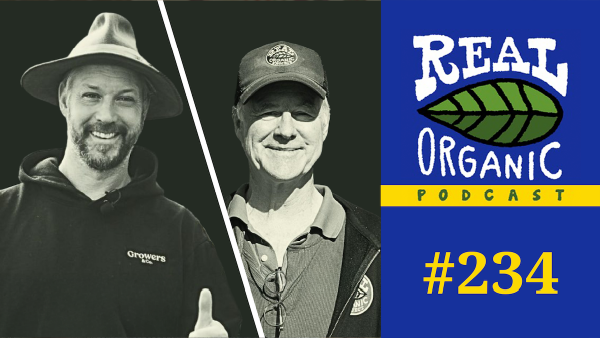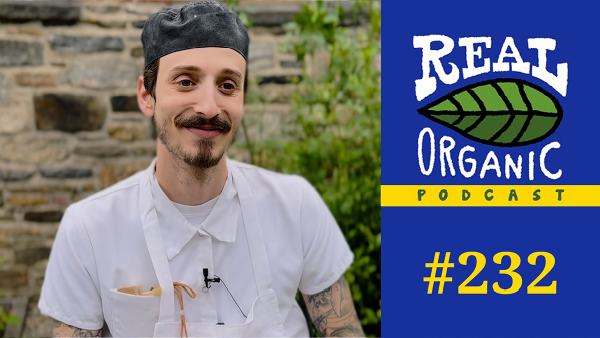Episode #233
Nicole Dehne: When Certification Meets Conviction
What does it take to protect organic standards from the inside? Nicole Dehne of Vermont Organic Farmers joins us to talk about the growing tension between hydroponics and organic standards – and why it matters to farmers and eaters alike. As one of the few USDA-accredited certifiers refusing to certify hydroponic operations, VOF is holding the line on soil-based farming and championing the small, diversified farms that built the organic movement. Nicole shares hard truths about consolidation, dairy losses, and the need for education in certification – and why she hasn’t given up on fixing the system from within.
Our Nicole Dehne interview has been edited and condensed for clarity:
You can subscribe and download episodes of our show through your favorite podcast app, our YouTube channel, or stream the audio-only version here:
Dave Chapman interviews Nicole Dehne at NOFAVT in Richmond, Vermont, April 2025:
Dave Chapman 0:00
Welcome to the Real Organic Podcast. I am talking today to an old friend of mine, Nicole Dehne.
Nicole Dehne 0:08
Thanks for having me.
Dave Chapman 0:10
It’s great to talk with you, even with all these scary cameras around.
Nicole Dehne 0:15
Yes. They’re very frightening.
Dave Chapman 0:18
I know. What is your title with Vermont Organic Farmers?
Nicole Dehne 0:26
I am the VOF director – the director of Vermont Organic Farmers. We’re an LLC owned by the nonprofit, Northeast Organic Farming Association of Vermont. That’s an important structure to us, and it sort of influences the way that we approach certification.
Dave Chapman 0:43
Of course, I was there when it was formed. It was a big decision about whether it was going to be part of NOFA Vermont or a standalone. I actually leaned towards standalone, but I was convinced because, at the time, there weren’t a lot of us, but we were strong, and we had a lot of passion. Some people from NOFA said, “If you are a standalone, it’s going to kill NOFA. We need this energy.” We didn’t want to kill NOFA. We believed in NOFA. So, we became a part of NOFA. I wanted a group that really represented organic farmers, which was what Vermont Organic Farmers was. It started as a certifying group. It was long before the USDA. What year was that?
Nicole Dehne 0:58
1985, I think, was when it started. It’s interesting that you say that about it being its own entity because my understanding is that it tried to walk the middle ground. When it was created, there were bylaws that were created for VOF. When I look at those bylaws, the impression I get is that farmers wanted to have some control over how the certification process worked and the certification decisions that were made. I think that feeling has sort of been maintained – at least, the idea of that – that farmer voice should be a part of the process. That was a really important piece that you all built in the beginning, and we still work to achieve that today. It’s an important value for us.
Nicole Dehne 2:28
Do you remember how many farmers there were in that first year certified by VOF?
Nicole Dehne 2:33
I heard there was some contention over who was the first organic farmer in Vermont. I’m not going to name names.
Dave Chapman 2:42
I’ve never heard that one.
Nicole Dehne 2:43
I heard that there was some contention. So, they didn’t want to give somebody the number, like, 01, or something like that. I feel like I don’t have the expertise to talk about this, but I think that there were, like, around 12-ish. When certification first started in Vermont, they were using a different organization. Then the farmers formed Vermont Organic Farmers. I think that was officially in 1985.
Dave Chapman 3:17
Was that Joseph Dunsmore or was that other organization? I remember he was buying greens from a lot of us, and he said, “We got to make some certification.” That was kind of the impetus for it. How many are certified now?
Nicole Dehne 3:35
Now we have close to 750.
Dave Chapman 3:40
What has the peak been?
Dave Chapman 3:42
The peak has been just under 800.
Dave Chapman 3:45
There’s been a little drop-off of about 50…
Nicole Dehne 3:47
There has been a little bit drop-off, yep.
Dave Chapman 3:49
And the last couple of years been rough.
Nicole Dehne 3:51
The last couple of years we’ve seen a little bit of a decline in our numbers. When we look at the reasons why people are dropping their certification, it’s not because they’re going conventional; it’s because they’re going out of business. We certify small, diversified operations, and what we’re seeing is those are the operations that are really struggling. Those are the businesses that are really struggling, and so we’re seeing them go out of business, and that’s affecting us, because those are the people we work with.
Dave Chapman 4:23
I know that it’s been a rough six years for organic dairy farms in Vermont.
Nicole Dehne 4:30
Yeah. We were close to 200 organic dairy farms. I think we actually exceeded just over 200. Then now we are, like, at 120-something. We have seen a huge decrease in our numbers there, which is really hard to watch.
Dave Chapman 4:51
Why do you think that is with…? Was it always impossible to make a living in organic dairy, and those people just hadn’t found out yet? Or has there been a shift in the market?
Nicole Dehne 5:00
No. I think there’s been a shift in the market. People were feeling like they were able to make money, and it was profitable. When I say that, I think it was making a living. It wasn’t like getting rich. But the cost of production for those farmers kept going up, but their pay price for what they were receiving for their milk was not going up. In fact, it was going down. There were quotas that were established, where it meant that people couldn’t produce more than a certain amount of milk. That’s what has made it really difficult to be profitable, and those farms are technically going out of business.
Nicole Dehne 5:41
It’s interesting now, because suddenly the milk market is opening up, and these buyers are looking for new organic dairies. We’re starting to see some new organic dairies get certified, and the price is going up a little bit. But things are so unpredictable at the moment with tariffs. People had been talking that the cost of organic grain had been going down, but I think it’s very uncertain as to what all those costs are going to look like with these new tariffs and such.
Dave Chapman 6:15
We’ll get back to organic grain in a minute. But I’m curious, do you think that the price was depressed? The price was good not that long ago, like in 2017. People were doing well, and small farms were able to make a living, not get rich, but make a living. Other small conventional farms in Vermont were going, “Maybe I should go organic.” It looked like they were going to. Then the thing tanked. Why did it tank?
Nicole Dehne 6:45
That is a complicated question that I can only speculate the answer.
Dave Chapman 6:49
I would love to hear your speculation.
Nicole Dehne 6:52
I think that there’s this consolidation in the industry, which is making it much harder for small, diversified farms to make any money. Even now, we’ve been seeing the number of organic dairy cows on each farm going up. Over the years, you could make a living on 30 milking cows. Then it was 55, and now it’s 75. They’ve had to increase the amount of milk that they’re producing in order to make a living. There’s also, of course, been interest from large corporate farms that have gotten into organic that can produce milk at a lesser cost. I think that lesser cost is a sacrifice for the quality of the milk and whether those cows are being pastured, and probably more importantly, that it’s like a family farm that’s operating the business. It’s like moving from a family farm to an industrial farm business that’s producing the milk.
Dave Chapman 8:15
When you say, “large corporate farms are moving in,” are they moving into Vermont?
Nicole Dehne 8:20
No, they’re not moving into Vermont.
Dave Chapman 8:23
You don’t certify any of these farms that are putting everybody out of business.
Nicole Dehne 8:27
Right. But we feel the impact of those farms because the buyers are choosing not to purchase milk from our producers and instead buy milk from producers where they can get the milk at a cheaper price. I just think it’s impacting the price overall. It’d be interesting to think about whether there should be a cost of production per region because I think traditionally it has cost more to produce milk in Vermont. I’m not sure of all the reasons why that is, but that’s what I’ve heard anecdotally. So, maybe there should be a price that New England producers get to accommodate those extra costs. I don’t think that was a very popular idea…
Dave Chapman 9:21
I think it’s a popular idea. When people go to buy organic milk, I think that they believe that they’re getting milk from a farm like Butterworks or…
Nicole Dehne 9:33
That’s the tragedy. I think the dairy farms and all the vegetable farms that we have in Vermont are what consumers expect when they think about an organic vegetable or an organic dairy farm. A family-run farm, small, someone who really cares about the environmental impact, all of those pieces, are what our producers are doing, but they’re the ones that are really struggling to make ends meet.
Dave Chapman 10:06
Including some truly excellent farmers. It’s not like, “Oh, you’re inefficient because you’re in Vermont and you’re not very good at it.” These are really bright people who are, I would say, pretty sophisticated businesspeople and very good technical managers, but they are playing by different rules from those large farms you’re talking about. Their animals live on pasture all summer, and that’s not the case for the other large industrial farms.
Nicole Dehne 10:28
Or those in large industrial farms, they might be meeting the pasture rule, but the pasture rule is 30% dry matter intake over 120 days minimum, and they might just be skirting by meeting it.
Dave Chapman 10:54
It’s still not what we would call…the animals aren’t on pasture for the summer.
Nicole Dehne 11:00
Or it just looks different. In Vermont, we can grow grass here – that’s one thing we do really well. But if you have an organic dairy farm in Arizona, I don’t even understand really what that looks like. I’m sure that there’s obviously areas that you’re going to be growing pasture there, but it’s going to look a little different.
Dave Chapman 11:27
I just think it’s an interesting thing where the… I’ve just been reading “Small is Beautiful.” the old book by E. F. Schumacher. It wasn’t old when he wrote it. It came out in the 70s. The subtitle of it is “A Study of Economics As If People Mattered.” He’s trying to understand why it is we keep choosing things that actually make us unhappy and that are not good for people. But our economic system has a bit of contempt for people’s welfare and has a lot of celebration of people’s profit. I think we’re trapped like in a bad dream. We don’t know quite how to break that trance.
Dave Chapman 12:14
I think this is a perfect example of where not only do people like the farm, the lifestyle, the animals, the much better animal welfare, these small farms, and the way that the people who are working on the farm are treated. But they also want the food that’s more nutritious. It is more nutritious; you can test for it and prove it. That it comes from those kinds of farms instead of the large confinement CAFOs.
Nicole Dehne 12:45
It does seem like, if we put agriculture in the same system as a factory, that that is the cheapest way to produce food. You’re right. We’re going to get cheap food that way, at what cost? It doesn’t seem like that model can work for agriculture if we’re looking for producers to produce food in the way that we want to see it in an organic way. The two don’t seem to be able to meet.
Dave Chapman 13:21
I don’t think that the food is the same. Of course, that’s what you’re saying, that the cheaper food is worth less. You might end up saving a little money here, but you pay it at the doctor’s office or at the hospital.
Nicole Dehne 13:35
I was reading this article about a pork operation in Korea. They were raising pigs in a building. It had gotten to that degree of taking the animal out of the land in its natural setting, because that would be, potentially, the way you could do it the cheapest. But at what cost as far as environmental and health…?
Dave Chapman 14:07
Well, not just in Korea, but also in Iowa, North Carolina, and Pennsylvania.
Nicole Dehne 14:14
A skyscraper. I was really fascinated by it. But it’s that idea of, “That’s the cheapest way that we’ll produce food, but not the way that we want to do it.”
Dave Chapman 14:28
Not the food we want to produce. First, let me just share Sam Welsh’s words of high praise for VOF. I once asked Sam – Sam is the director of OneCert, Inc., and somebody who has very high standards of integrity in their certification process. This was a long time ago – I said, “Sam, what do you think of VOF, Vermont Organic Farmers?” He said, “VOF is the very best, except for us.” We’re right there with them. He said, “Then the further you get from them, the worse it gets.” I thought that was really interesting, and I think it’s true. I think that there is a geographical thing that, for whatever reason – I don’t say this out of any kind of my country – I think that there’s not very much big ag money in the northeast. That’s why it’s not corrupted here.
Nicole Dehne 15:33
Before I heard you say people praise VOF, I had already heard people really praise VOF. The analogy that I’ve used is like we’re teachers teaching A+ students. The reason we have integrity is because the farmers have integrity. It’s easy for us because we don’t have people pushing on us. The farmers themselves want to do the right thing and believe in the system. What I think we might be missing in certification is, I think we’re only going to get so far if we think of certification as purely regulatory. I think it has to be hand in hand with education. We’re only going to get so far regulating people to do the right thing. We have to convince them that this is the thing that they want to do, and it makes sense for their farm, and it works for their business, and all of that piece.
Nicole Dehne 16:30
That is the piece I think that’s powerful about having a certification agency connected to the nonprofit. Because the nonprofit piece has traditionally been the education side. I think when we have certifiers who don’t have that education piece, that’s an important piece that’s missing. We’ve even struggled with it ourselves and had to sort of go back to the education piece and say, “We need more of this.” But I think that’s missing from the USDA piece too – we got really hung up in the beginning about, “We are regulatory only, and we can’t do any education piece.” That’s not how it was started in the beginning. It was all about learning, education, and support of each other, of farmers. Here in Vermont, that’s the piece that I think that we really benefit from too.
Dave Chapman 17:27
From the education, from the community building, the learning, and the movement. It’s interesting; it seems that the National Organic Program, the USDA program that is assigned to organic, we’re not quite sure they’re going to exist anymore, but we’ll find out. It seems that they really wanted to separate education and regulation certification as a regulatory thing as essentially a business transaction. This debate goes back a long way. I interviewed Patrick Holden, who was one of the early people, the second generation, in the Soil Association, and he and Lady Eve Balfour had a conflict around this very issue. Peter Segger, who I just interviewed, also was right there with Patrick.
Dave Chapman 18:28
They were called the Young Turks. They were right the same time that we were starting. They wanted certification because they were trying to figure out the creation of a business system whereby they could make a living. A lot of the older guard were lords and ladies, and they didn’t really see it so much as a business – they saw it entirely as a movement. Lady Eve said, “If you do this, then this is going to become a business, and it’s going to be corrupted.” They said, “If we don’t do it, it will never grow, and it will never have any impact on the country and agriculture.” I believe that they both had really good points. Here we have Solomon’s choice of, “How do we grow this so that it’s food that’s available to everybody?” So, it needs to replicate a lot, and how do we keep it as a movement and keep our integrity?
Nicole Dehne 19:35
It needs to be a business in that people need to be able to make a living. I sort of err to the side of trying to find that balance between… and I feel like we see that on the national level. The way we interpret the regulations is there’s a side of, “We want to have integrity. We want things to be as pure as possible.” But people are trying to run a business, and we can’t create regulations that make it so hard that it’s too difficult and it can’t make any money.
Nicole Dehne 20:08
So, there does have to be a balance. That balance is easier when you’re dealing with producers that also really believe in the practices and are maybe less likely to want to take shortcuts. Those are conversations we have with our farmers all the time – trying to be practical with how we’re thinking about the practices that we’re acquiring.
Dave Chapman 20:08
It’s got to be a conversation that includes the eaters because they have to care enough to want to choose the stuff that’s been grown. That’s the whole point. When we started, it was part of a big, big movement. It wasn’t just about food; it wasn’t just about organic. It was about everything. When I say ‘we,’ organic has been around since 1935 as a political movement. But when it hit America and it hit in the 60s and 70s, it changed. It became kind of volcanic, what happened. But that was part of a movement where we were questioning everything and saying, “We need to find a better way.” I can’t say we were totally successful in that, but that is the roots of organic in our country. That is what it meant.
Nicole Dehne 21:34
Probably even beyond that, there were movements from people earlier, working with natural systems: Native Americans, all of those values.
Dave Chapman 21:50
For them, it wasn’t a political movement; it was how they lived and how they farmed. Organic farming has existed for thousands of years under many names. There was also some bad agriculture, traditionally, too. It wasn’t all good, but there was some very high-level agriculture that certainly we would all say, “That’s real organic.” I think that the thing that happened in Europe…it’s not that the information came from Europe. Famously, Albert Howard was bringing it back from India, and in this country, FH King was bringing it back from China, Japan, and Korea.
Dave Chapman 22:32
We were looking to the rest of the world for how to farm well. But what happened in Europe, and that was brought to America, is it became a political movement, saying, “You know what? This chemical invasion is screwed up. We need to speak up against it. We need to create an alternative.” I think that was a critical thing – this was a political movement. I don’t mean Democrats and Republicans; I mean we need to speak out against something bad that’s happening that profits a few and hurts the many.
Nicole Dehne 23:07
Then that chemical agriculture was also being brought to other countries in the world. Now that political movement is connecting on a global level too. That seems like a weakness for our organic program and our organic certification in the US. I wish we had more ties to other countries to better understand how they do things. Those would be really interesting conversations and learning journeys to improve how we do things here by learning how folks are doing it in Europe, Mexico, Canada, and India.
Dave Chapman 23:53
That’s a great idea. We should organize something…
Nicole Dehne 23:55
I’d love to do that.
Dave Chapman 23:57
We should do that. Obviously, the Real Organic Project is connecting with people. The people are reaching out to us.
Nicole Dehne 24:06
Which is really cool.
Dave Chapman 24:07
I’m having phone calls with people in China saying, “We need the Real Organic Project here. There’s lots of organic, but it’s not real. It’s very corrupt. It’s run by the government. Would you come and do this?” I said, “No, I’m sorry. You need to do it. That’s the whole point of what we’re doing. I don’t even know what the word for organic is in China. It’s not organic; it’s a different word. But you have something that’s important, and it’s threatened. But I’ll help you if we can. We’ll help you organize.”
Dave Chapman 24:33
But in Australia, we hear from them a lot. They’re fighting the battle there. Right now, there’s a big group in Australia – big money – trying to get hydroponic certified as organic. They’re going, “Well, the US does it. Why can’t we do it?” Of course, the people who want it to be based on the soil are saying, “The EU won’t allow that. Why should we allow it?” They’re talking to us because they understand that we’re allies in this. Our actions in the US are being used against the world organic movement.
Nicole Dehne 25:19
That’s painful.
Dave Chapman 25:20
It’s painful. Could you just tell me a little bit about Enid Wonnacott? I thought Enid was just fantastic. She died, and I’m so glad we got one interview with her before she died. But could you tell me a little bit about Enid?
Nicole Dehne 25:39
Sure. The lore is that Enid inherited NOFA as an organization, like a paper box with a couple of files in it. She took it and grew it into the successful organization that it is today. Even this building that we’re in and even this table right here. This is all Enid helping us become an organization that’s really secure. What was really important to Enid – and I think this is what she passed on to me – is that piece about listening to farmers and farmers being involved in the process. She never wanted it to be a type of certification program, or – even on the work that she was doing on the NOFA side – someone who was working in isolation not really understanding the needs of farmers or talking down to them.
Nicole Dehne 26:39
She really wanted to make sure the work she was doing was relevant, and she went to farmers often to talk to them, to say, “Is this relevant? What do you think of this idea?” There’s that piece of her. Then also, she was just a very warm and fun individual. She was able to work really hard and play really hard. She’s also famous for her crazy slow hugs, where she would hug you until you started to feel a little uncomfortable, and then she would let you go. She just had this way of creating community.
Nicole Dehne 26:39
I think this is something that is a little special in Vermont because we’re a small state, but creating community amongst people who might not agree on all the issues but could probably find similar values. So that was, I think, some of the stuff that was really special about her.
Dave Chapman 27:42
I’ve heard she was a special person and really great. She did such a good job of continuing to build community. I agree, she never left the farmers out. She didn’t wander that far from the roots. I see many nonprofits now are wandering far from the roots, and she never let that happen. What’s the relationship right now between Vermont Organic Farmers and the USDA? It’s wild times, obviously, in the USDA right now. So, let’s go back a year first, and then we’ll come to right now. What’s the relationship between USDA and VOF?
Nicole Dehne 28:29
We’re committed to working within the USDA system, and we’re working to try to make improvements also. We’ve had an administrator at the National Organic Program for a long time, Dr. Jenny Tucker, who has done a really good job of making that program work smoothly. Whether you agree with all the things that she has done or valued, she has definitely been helpful about… I always felt that she was very good and very transparent about, “This is how the system works. If you would like to get something changed, here’s the levers, in some ways.”
Nicole Dehne 29:25
She, I think, focused on things that the organic industry, including ourselves, were saying were problems. So, there was the strengthening of organic enforcement to try to address fraud in the industry. Also, we’ve recently had the Organic Livestock and Poultry Standards Act to improve animal welfare standards, which are both important. I don’t know that they’ve had a huge impact as far as changes to practices that our farmers have done, but they have hopefully addressed fraud in areas where fraud needed to be addressed. There are definitely things that we disagree with, with the NOP – allowing the certification of hydroponics is definitely one of them.
Dave Chapman 30:24
When she said that a three-year transition was required for all crops that were grown on the land, including hydroponic crops, and you asked her, “What does it mean on the land?” I think she refused to answer. I know she refused to answer me. She refused to answer the head of the NOSB, Harriet Behar. I’m just curious, did she answer you?
Nicole Dehne 30:49
I don’t think so, but they don’t answer those kinds of specific questions a lot. Sometimes that’s good, and sometimes that’s bad. I don’t know that we want the National Organic Program and the folks in those roles making those kinds of interpretation decisions. I guess partly because we’re concerned with what their interpretation is going to be. Typically, when we ask a question, we usually say, “This is how we’d like this question to be answered.” Then we give it to them packaged like that. I don’t know. What I’m trying to say here is that I think that there are some things about the NOP that I think are valuable. I think that the public process and their requirement, the transparency in some ways – in some parts – is really important.
Nicole Dehne 31:45
Having said that, I know that there are workings behind the scenes that impact the program and what they’re allowed to do that we don’t see, that aren’t transparent, that aren’t working in our favor, or in the favor of small, diversified operations or farms in Vermont. Like I said, I think one of the differences, probably, between VOF and ROP is maybe we haven’t given up on the NOP. We are still trying to work within the system, even though we see areas that are failing and need improvement, and probably, as a program, we distinguish ourselves from the USDA too. We value USDA Organic, but we get to say – since we only certify in Vermont – that we have a stronger standard because we get to have strong interpretations of the regulations.
Dave Chapman 32:53
I’m curious; I really don’t know this. Does Vermont Organic Farmers or NOFA get funding from USDA in any way?
Nicole Dehne 33:02
From USDA?
Dave Chapman 33:03
Yeah.
Nicole Dehne 33:04
Yes. We have some funding, like some federal grants from USDA. We have received funding from the Transition to Organic Partnership Program. Mostly that funding is on the NOFA side, but some of it is for the educational work that we do on the VOF side. That’s more recent…
Dave Chapman 33:27
Has that funding been suspended?
Nicole Dehne 33:30
Not yet.
Dave Chapman 33:31
Not yet? Congratulations.
Nicole Dehne 33:34
Who knows what’s going to happen? If you were worried about, like, a conflict of interest, we’re probably paying the NOP more than we could. But we do have to pay them for the auditing when they audit us and when we send in our internal audits and that sort of things.
Dave Chapman 33:52
I don’t have an agenda here, but I’m curious if they went away, would VOF – assuming that farmers still want to get certified for something – and NOFA be unfazed, or would you go, “Well, we’re going to have to lay off a quarter of the people”?
Nicole Dehne 34:13
As far as funding?
Dave Chapman 34:14
Yeah.
Nicole Dehne 34:14
No. VOF would not be… The vast majority of our funding comes from our certification program fees.
Dave Chapman 34:28
This is something people don’t necessarily know. But for now, because the Farm Bill has not been passed yet, we’ve lost the support for the certification – the cost share – where they share the cost. Up to a small level – $750 maximum for…
Nicole Dehne 34:49
For helping pay the certification fee back. Well, there’s a little nuance there, in that there are two pots of funding. There is permanent funding that is available to 15 states – Vermont is one of those states. So, cost share funding should, theoretically, be funded even when that funding that comes through the Farm Bill is not because we actually have an example of this from, like, seven years ago. It’s just so unclear now what will happen. But, technically, farmers in 2025 in Vermont should get cost share funding. I just don’t feel very secure about that right now because everything seems so…
Dave Chapman 35:33
Was that something that Leahy pulled on?
Nicole Dehne 35:36
Yes. It was through some crop insurance bill or something. Leahy…
Dave Chapman 35:42
Senator Patrick Leahy, of course, was the Vermont senator who was the co-sponsor of the Organic Food Production Act.
Nicole Dehne 35:50
Yep. They called him the grandfather of organic.
Dave Chapman 35:53
The OFPA passed when you were still a kid, I guess. It passed in 1990?
Nicole Dehne 35:59
Yeah. In the 90s.
Dave Chapman 36:01
You were about 15?
Nicole Dehne 36:02
Right.
Dave Chapman 36:02
Okay. You were a very young adult. You weren’t part of that with Kathleen Marroquin.
Nicole Dehne 36:11
No, but Enid was part of that. Prior to the National Organic Program, and you know this, obviously, but I think this was something really special that Enid would always kind of be poetic about and be nostalgic about, was that the farmers in Vermont used to come together to decide what the standard should be for defining organic production. That was like coming together in a room and having a lively discussion about what should happen.
Dave Chapman 36:46
I can testify because I went to that every year. We all went to it every year. It was an important meeting. It wasn’t, “Oh, I don’t think I’ll go to the annual meeting this year.” It was like, “No, no, we have to go because we’re going to vote on what our standards are.” It was so nuanced. The audience was so informed. We would have impassioned conversations. It wasn’t that everyone agreed. There were some famous ones about, like Chilean nitrate. There was one farm, in particular, that said, “We’ll go bankrupt without this.” The group voted, “No. Sorry. We don’t consider that to be organic.” It wasn’t that we disliked these people; it was a contentious issue.
Nicole Dehne 37:37
Vermont was a state that wasn’t supportive of having organic move to a federal program, but when it looked like it was going in that direction, then Enid was participating to make sure that the Vermont farmers voices were part of that national conversation about what the standards should be. But I always thought it was really interesting. She told me a story about…Vermont used to allow the calves to be treated with antibiotics if they were six months or younger because that’s a vulnerable period for a calf, and they often get pneumonia, and antibiotic was a great treatment for that. They’re two years away from milking, it’s a very reasonable, farmer-friendly standard.
Nicole Dehne 38:21
But when they were having that conversation on the national level, it was actually the milk buyers who were saying, “This is a little too nuanced to market.” It’s easier to say, “No antibiotics allowed ever.” That became the rule. That’s just an interesting little example of, like, when the farmers are out of the picture more, which is what’s happening when it goes to the national level because it’s harder for farmers to get there versus meeting in Randolph in Vermont.
Dave Chapman 38:54
I supported that limited use of antibiotics as I do for myself and my children. Obviously, the wholesale use as, “Just give them all a shot because they put on weight faster,” I don’t support it. In the EU, they allowed the limited use of antibiotics for animals also. That’s interesting. I hadn’t heard why that got…
Nicole Dehne 39:18
That’s what Enid told me.
Dave Chapman 39:20
That makes sense to me. I actually thought that they wrote a great law. It was a pretty amazing document, really.
Nicole Dehne 39:33
Yeah. It really is. It’s a very progressive document, especially for the time. It still is.
Nicole Dehne 39:39
It still is. The problem is the interpretation of it has been difficult.
Nicole Dehne 39:54
There are examples, Dave, and there have been improvements. The law used to say that a significant amount of ruminants diet should come from pasture. That term ‘significant’ was too loose. I can understand that. That’s when the pasture rule got tightened up with numbers of this 30% dry matter intake from pasture. I do think we should acknowledge that it is imperfect, but it’s actually a pretty amazing process that there’s a public meeting twice a year – or there used to be – where people come together and are pretty much replicating what was happening in Vermont on that farmer scale. The problem now, I suppose, is these pressures of larger industries that have more influence.
Dave Chapman 41:00
Those meetings – the National Organic Standards Board meetings – most of the people testifying are not from farmer groups or farmers. They’re mostly lobbyists for people who want something to be approved. Of course, it’s a business thing, and it’s hard for farmers to get away. I was amazed. The first one of those I went to – and I went to the National Organic Coalition meeting the day before – and I’m like, “Who are these people?” They’re all sitting around this big table, and they’re nicely dressed, and they’re obviously mostly our friends. They knew each other very well. They’ve been coming to these meetings twice a year for years; they know each other. It’s a social occasion. But I had never met any of them. I’m like, “I didn’t know all this was going on.” I was fairly deep into organic. I wasn’t an activist in that sense; I farmed. But anyway, I was quite surprised.
Nicole Dehne 42:04
Maybe that’s part of the solution – if we want the National Organic Program to be successful, it would be like getting more farmer voice involved there, or more farmer involvement – figuring out a way to do that.
Nicole Dehne 42:18
It’s hard. Of course, we did that in Jacksonville. We had 60 farmers fly in from around the country, and they were completely ignored by the National Organic Standards Board.
Nicole Dehne 42:29
I’m saying like different structures, like regional meetings. A structural change to ensure that farmer voice is…
Dave Chapman 42:40
The challenge here, Nicole, is that even if the National Organic Standards Board did listen, the USDA doesn’t listen to them – they ignore their recommendations. It’s wonderful that we have… Well, more than a couple. Twenty recommendations over 10 years were not acted on. All of the recommendations for a decade – this is from the Organic Trade Association – we’re not acted on. It’s pretty bad. If they do act on them, they’re so watered down by the time they come out as to not have much meaning.
Nicole Dehne 42:40
I think that’s totally valid, and I think some of the recommendations are tough too.
Dave Chapman 43:29
Like the one against hydroponics. That one should have been acted on. It did pass. You have been a core organizer of the Soil Working Group. Nobody knows what that is – I know what it is – so why don’t you tell us about it?
Nicole Dehne 43:45
The Soil Working Group is a very informal but committed meeting of certifiers and other organizations that feel very strongly that hydroponic operation shouldn’t be allowed to be certified organic. We were coming together as a bunch of different organizations, a bunch of busy individuals trying to figure out how to move that concept forward – how to talk to consumers about it, how to affect change on the national level, and how to get other certifiers on board or involved, or seeing who else is out there and whether there’s any compromise in the certifier world for this issue. We’re trying our best. We meet once a month, and we met today.
Dave Chapman 44:55
As one person put it, if nothing else, this is group therapy. We need it. People were feeling a little shell-shocked. There was actually a resolution passed for this group?
Nicole Dehne 45:09
Part of the conversation that’s been had amongst certifiers is that there isn’t a shared policy or narrative about why we don’t certify hydroponics as organic. Then there’s a lot of conversation about, “Well, what about certifying mushrooms? What about potted plants? Where would this all fit in? How would you handle the logic of what you certify and what you don’t certify?” We worked together to put a policy together to outline those things. Then all signed on and said, “This is kind of, I suppose, our stance and what we believe in and why we’re not certifying hydroponics.” For VOF, that was in our guidelines book since I started, and obviously it was in there before. But it was just always a tenant that said very clearly in our guidelines that we won’t certify hydroponics.
Dave Chapman 45:37
You put this out as a public proclamation to the world. I think now there are 10 USDA-accredited certifiers who have signed on to this. They certify, I believe, over 8,000 operations between them, which is a lot of operations. This isn’t just a small like Vermont’s 700 farms. God bless Vermont because their impact is far greater than 700 farms. But this is, I think, a fifth of the certified operations certified by the USDA. There are many other operations under other certifiers who agree with this completely. I would say the vast majority of farmers agree with this.
Dave Chapman 47:10
But this was a heroic thing where certifiers who have a business relationship with the USDA, and if that relationship is destroyed, your certifying agency is out of business. If they say, “Because of what you’re saying, you’re out of here.” It’s a scary thing. In fact, one of the certifiers was given a non-compliance because they said, “We won’t certify hydroponic because we think it’s illegal.” That was OneCert, and they’re very open about it. Was there any sense of collective security, of coming together like this? I felt that if people could come together, they would be safe from that because the USDA is going to say, “All 10 of you are decertified.” I don’t think so, but they might say it to one.
Nicole Dehne 48:12
Right. I think there is some power in coming together and saying, “This is what we believe, and this is why we don’t certify these types of operations.” I think something that we don’t do well, but partially, I suppose it’s because we don’t have the time and capacity. I think that there are more certifiers out there who would join the meeting and the group, but just trying to figure out how to do that has been hard for us because of the other work that we do.
Dave Chapman 48:50
So much work, yeah. Maybe the Real Organic Project can help with that. We’re a part of the group. We’re the one non-USDA certifier. We’re not a certifier. We do an add-on…
Nicole Dehne 49:02
You and Cornucopia.
Dave Chapman 49:04
Well, now Cornucopia. But in the beginning, it was a small group. You very nicely invited me to join.
Nicole Dehne 49:11
We did.
Dave Chapman 49:12
I thank you.
Nicole Dehne 49:12
Partly because I think we felt like we needed some organizations that weren’t certifiers. Because I think we can do our part by saying, “Hey, we’re not going to certify these operations.” But I think we needed some assistance and need some assistance in how to expand that movement.
Dave Chapman 49:33
Certainly, we’re so much stronger when we come together. It’s the only way.
Nicole Dehne 49:37
It’s the only way out. That’s true.
Dave Chapman 49:41
We’re getting towards the end, but there’s something I wanted to ask you about. You’ve become an eloquent champion of “Small is Beautiful.” You might not think of it that way, but I’ve heard you speak now a number of times about the need to address monopoly in our food system. That so much of the damage that is done is because of the consolidation of power into a few hands. That’s why we struggle with the National Organic Program. Why is it that there’s any contention about hydroponic or we didn’t even get into grain fraud or CAFOs? I think because there’s a lot of money involved, a lot of money now. Do you want to share any thoughts about that?
Nicole Dehne 50:31
Honestly, I wish that I could speak more eloquently about it. I just think that part of the issue is that… Most Americans would want more competition amongst businesses, but I think what’s happening is with the consolidation of agriculture and certain businesses holding all the power – controlling the prices of things, controlling what goes into the grocery stores, like that – it really hinders the competition of all the small, medium-sized businesses. That’s the problem. I think that’s kind of an un-American ideal and value. But unfortunately, it seems like our judicial system has sort of said, “Well, if the prices are cheaper for consumers and it’s not a monopoly.”
Dave Chapman 50:35
Actually, that wasn’t the judicial system that said that. That was the executive branch that was under Ronald Reagan. It was Robert Bork who issued that new policy, that they were no longer going to interpret the antitrust laws to be about a protection of democracy; it’s going to be about a protection of the consumer. Very different from the way the law was written.
Nicole Dehne 51:41
That, I think, is affecting all our small businesses, like, “Can people make a living anymore on the land with a small farm operation?” That’s what doesn’t seem to be working. In some ways, I wish I did understand it better, but I think the costs keep going up for our small farms. They’re competing price-wise with what looks like the same product, but is produced vastly different. It’s like, “How can Dave’s tomato be produced at the same price as what’s coming from Mexico in these huge greenhouses without any soil?” It’s not the same product, and yet they’re competing at the same price point.
Nicole Dehne 51:55
Without any labor laws, without any environmental…
Nicole Dehne 52:21
So, it’s stifling the competition – putting out of business our small operations, and they can’t compete. But it’s not the same product. They really shouldn’t be competing with these huge monopolies.
Dave Chapman 53:18
That’s our work for the next generation and the rest of our generation. We have work to do here.
Nicole Dehne 53:24
I think the problem was that organic, for a long time, was a home for the small producer, where they didn’t have to compete with the large industrial farms. Once those large industrial farms came into organic, that’s when things got complicated and unfair.
Dave Chapman 53:44
Good. All right, Nicole, before we close, I always ask people, “Is there anything else you’d like to say?” Something I didn’t ask or something that you just think is important for people to think of.
Nicole Dehne 53:58
Well, I would say I don’t want people to lose faith in the organic label, but I do think that people need to pay attention to it and tend to it a little. I don’t think we should stop buying organic products, but I think we should be paying attention to what types of organic products we are buying. That is the role that the Real Organic Project plays. I would also stand by all of the products that we certify as Vermont Organic Farmers too.
Dave Chapman 54:34
Me too. I think the Real Organic Project is just an attempt to connect all the people who really care, which is not just in one state, and we need each other. Emily Oakley’s, famous line, “Vermont can do it without Oklahoma, but Oklahoma can’t do it without Vermont,” is why we became a national organization. I actually don’t think Vermont can do it without Oklahoma. I think that we’re all in this together. Nicole Dehne, thank you so much.
Nicole Dehne 55:09
Thanks, Dave. Thanks for having me.


